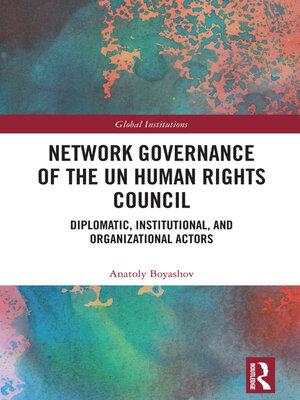Network Governance of the UN Human Rights Council
ebook ∣ Diplomatic, Institutional, and Organizational Actors · Global Institutions
By Anatoly Boyashov

Sign up to save your library
With an OverDrive account, you can save your favorite libraries for at-a-glance information about availability. Find out more about OverDrive accounts.
Find this title in Libby, the library reading app by OverDrive.



Search for a digital library with this title
Title found at these libraries:
| Library Name | Distance |
|---|---|
| Loading... |
This book explores how the structures of international organizations have become increasingly complex and considers why states choose to become part of networks of international organizations alongside non-state actors.
While granting participation rights to non-state actors, states have been actively involved in establishing complex ties with them. International organizations, in their turn, have enhanced the sustainment of complex networks. The author argues that the involvement in networks of international organizations provides better capacities in communication. Thus, being a governmental or non-governmental entity, an actor tends to occupy the beneficial structural positions of a leader, connecting to as many actors as possible; or a broker bridging isolated subgroups within a network. Through a study of the UN Human Rights Council (HRC) and the respective diplomatic, institutional, and organizational networks that participate in it, he explores the most visible stakeholders, the institutional setting of the HRC, and the multilateral negotiations on the prevention of human rights violations in 2010-2019.
The volume will appeal to scholars, students and practitioners interested in the international organisations, networks, foreign policy, the United Nations and the Human Rights Council.







